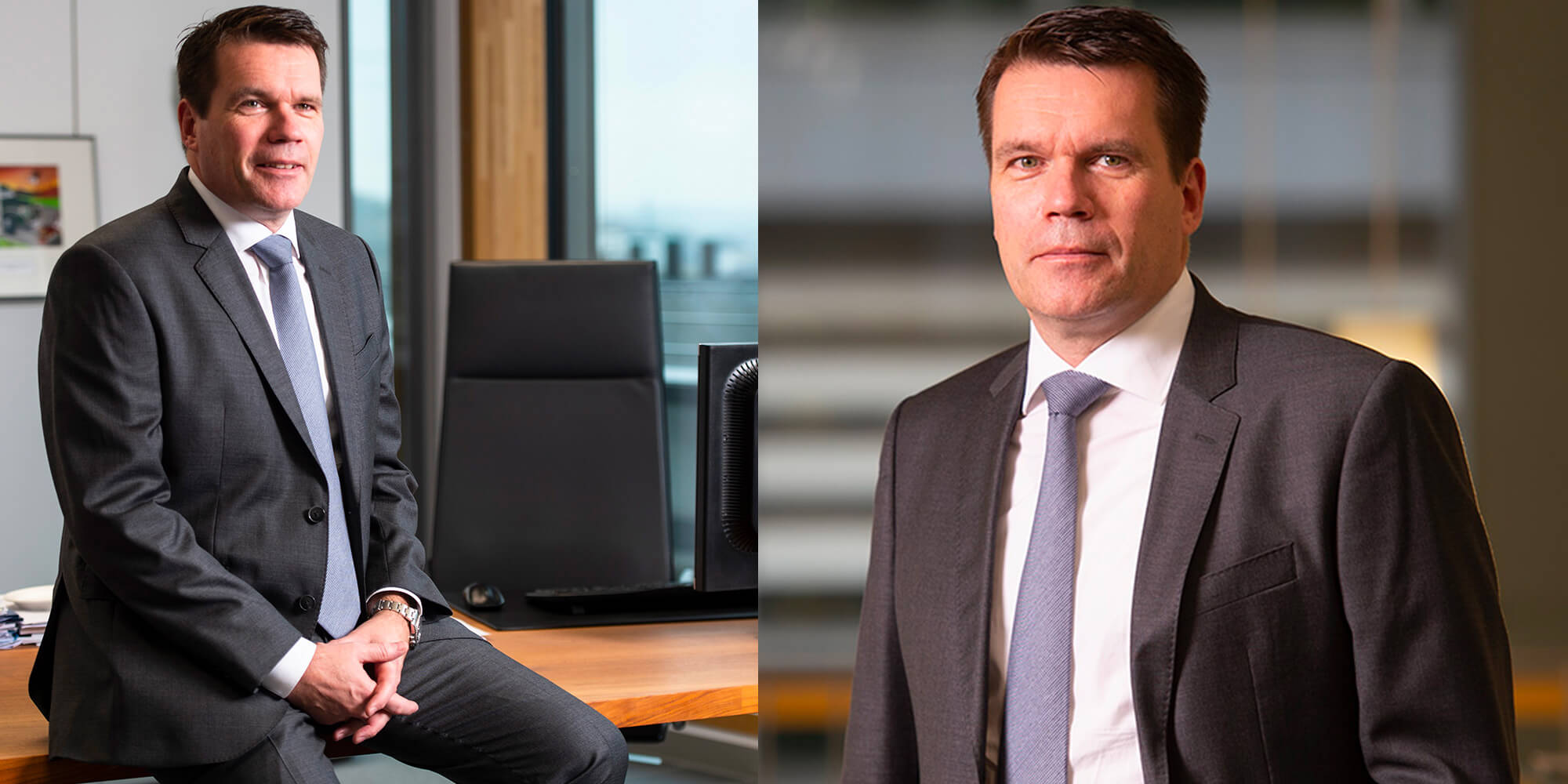Interview Claude Strasser - Integrated Report 2020 - POSTGroup
POST Luxembourg kept its operations running in 2020 while taking on new roles linked to the COVID-19 crisis. It overcame this challenge without any real stumbles, reflecting the maturity and robustness of the organization, and the unwavering commitment of its staff. Let’s take stock of an extraordinary year with Claude Strasser, Managing Director of POST Luxembourg.
"That emerged during this crisis an asset for POST'S FUTURE DEVELOPMENT"
As the title of this report suggests, 2020 was a year in which post showed its strengths and strategy. what are these strengths?
Claude Strasser (CS): The crisis showed our ability to play our public utility and universal service role in critical times: night-time delivery of newspapers, daily postal rounds, delivery of 47% more parcels, a sales network that kept running throughout the crisis, resilient technology networks, home support from our telecom teams, and much more. POST’s collective success in 2020 did not come about by chance: it reflects the maturity and robustness of our organisation. We also surprised a lot of people by proving high agility in adding one-off tasks and projects to an already very busy schedule, in order to manage the consequences of the crisis. One example of this is the call centre that we set up for the Grand-Ducal Fire and Rescue Corps (CGDIS) at the government’s request. The offices and technology available to us meant the call centre was operational within 48 hours. The same strengths were brought to bear to distribute masks across Luxembourg City. Hundreds of employees spent a weekend taking turns at our Findel logistics centre to ensure that 600,000 masks reached their destination in record time.
How was post able to demonstrate such agility?
CS: Again, it would not have been possible without our efforts to transform the structure of the business over the recent years. And it would have been utterly impossible to demonstrate such agility without the motivation and engagement of our staff. The crisis brought some pleasant surprises at a human level; everyone did their duty with unwavering commitment. Our workforce was understanding and showed dedication all year long.
How can post maintain this robustness over the long term?
CS: This robustness is built on firm foundations. I see it as a given, but we must not take our eye off the ball. The goal is to go even further. Last year we showed what we can accomplish in a short space of time: this exceptional response must become the norm. We need to make the spontaneity that emerged during this crisis an asset for POST’s future development.
Is it possible to nurture spontaneity without a crisis?
CS: It’s a management challenge that depends on individual responsibility. Let’s take the example of the approach adopted by our Crisis Response Unit: when lockdown was announced, we asked every manager to personally organise their team members’ presence in the office, considering the real-life situation and team requirements, while following the rules and meeting clear objectives. This method saved us precious time, allowing us to adapt in a matter of hours.
When did you realise that covid-19 might have a lasting impact?
CS: Until the first staff member was tested positive in early March, we were just being watchful, like many people. Over time, we started to pick up on the – legitimate – apprehension of our teams, starting with our mail delivery workers and sales teams who were out on duty, at a time when the general line was ‘Bleif Doheem’. That was when I felt the need to go and meet our staff to reassure them. As senior managers, we made sure we were present to offer reassurance and encourage our teams to rally together and keep providing the services that the government had classed as essential by that point. Reaching out to our teams helped ease their concerns, and offered an important opportunity for dialogue early on in the crisis. The crisis also highlighted the importance of certain industries – including POST’s – for society as a whole.
How do you keep a cool head in such a situation?
CS: I don’t really have an explanation, but going into the office every day and constantly interacting with members of the senior management team who were also on the premises made me feel in full control of the company. This made a calm approach to crisis management much easier, which is what we think we achieved.
2020 was doubly exceptional in that post’s three business lines succeeded in hitting their annual targets while managing the crisis each day. how do you explain these achievements?
CS: I can’t remember a year in which POST made so much progress at every level, on some extremely ambitious projects. Were we able to achieve these things because of the crisis or despite it? Maybe we were all less worried about incidental matters and worked with more focus. The crisis showed us that we can implement plans more quickly and effectively if we act a little more boldly and bravely. We should use this collective energy to move us closer to our goals. THE ‘MIR SINN D’POST’ STRATEGY RUNS UNTIL 2022. WHAT WILL THE NEXT STEPS BE? CS: By 2022, we want to have made digital channels as efficient as the other channels that we use. After building the IT framework that will allow us to achieve this aim, we’ve entered the operational phase of this strategic programme.
Will digital still be a common thread under the new strategy after 2022?
CS: First and foremost, in 2022, we will be able to capitalize on the transformation of our traditional business lines. I’m thinking of our postal service, of course, which now includes logistics. The latter has brought in extra revenue over the past five years, but will need turning into a sustainable, profitable business. Yet that wasn’t our primary goal. We were actually looking for something to offset the decline in mail volumes. After 2022, we will have to prioritise segments with higher added value. As a public institution, our involvement in logistics has to make sense. We are not aiming to transport every parcel from the e-commerce giants to Findel so that we can then deliver them across Europe. Our strategy will see us become more relevant, more granular, in how we conduct our business.
What about telecom & ict?
CS: This pattern also applies to the Telecom business line, which now has a significant ICT division following several years of takeovers. Home soil will remain our priority, keeping in mind that we will have to continue setting ourselves apart from foreign operators who also have their sights set on Luxembourg. The international market will only be of interest to us if we can provide a service from Luxembourg. In this regard, Cyberforce’s work in cybersecurity and the Data Intelligence team’s work in using our customers’ data reflect the ‘Mir sinn d’POST’ strategy. These are the activities of the future and growth drivers for the Group as a whole.
Is csr taken into account as part of business development at post?
CS: This aspect will be even more significant in the next stage of our development. We will give more consideration to how we can improve our approach to finance and sustainability, whereas we had previously looked mainly at what we were capable of doing.
How should post pursue its goal of being a company that creates value over the long term?
CS: In certain areas, such as employee wellbeing and working conditions, we have already made good progress. In others, we will have to change our habits. I’m thinking in particular about the carbon footprint of our postal delivery service through the CO2 emissions of our internal combustion vehicles. As far as customers are concerned, we probably need to be even more inclusive. POST Finance will continue to focus its efforts on those members of society who would have no access to financial services without one of our current accounts. Meanwhile, telecom products and services could be rethought to reach target audiences such as elderly people, who sometimes feel excluded from the digital world and technological advances.
How does post want to be seen from the outside?
CS: For nearly 180 years, POST has embraced its heritage along with its public utility and universal service role. However, some people still have a perception of the company that is overly tied to its history. Our entrepreneurial spirit and significant contribution to Luxembourg’s economic ecosystem should undoubtedly give us a more vibrant, modern image.
What impact could the crisis have on the national economy?
CS: I’m still very cautious, but I keep being surprised by how the situation is unfolding. Quite clearly, the economy has not collapsed. Even public debt – which is not as it was in the good old days – does not seem to be reaching the catastrophic levels feared at the beginning of the crisis. But the bill that society will have to pay in the medium term could be hefty.
Does luxembourg need to carve out a niche for itself in a new sector to continue its economic diversification?
CS: The healthcare sector was already one of our top-priority verticals before the crisis. Given the needs that have been expressed since it broke out, and Luxembourg’s determination to continue diversifying its economy in value-added industries, public and private actors really ought to look into developing medical expertise.
"Our entrepreneurial spirit and significant contribution to Luxembourg’s economic ecosystem should give us a more vibrant, modern image,’ says Claude Strasser, Managing Director of POST Luxembourg."
About POST Luxembourg
POST Luxembourg is the country's leading postal and telecommunications operator, offering its services to residential and business customers. Other activities include postal financial services and philately. With over 4,500 employees working for the company and its subsidiaries, the POST Luxembourg Group is one of Luxembourg's leading employers.
Founded in 1842 as an administration, POST Luxembourg has been a public company owned by the Luxembourg State since 1992. Facilitating the communication and transmission of information, data and content between individuals and businesses in Luxembourg and around the world is the vision of the POST Luxembourg Group.
For further information: www.postgroup.lu and www.post.lu

Supplier Code of Conduct
The Procurement Department has developed a code of conduct to promote purchasing and subcontracting in line with POST Luxembourg's CSR approach.
Annual Report
Discover how POST creates value for all our stakeholders and Luxembourg, as well as the CSR approach that is embedded in all our activities.

